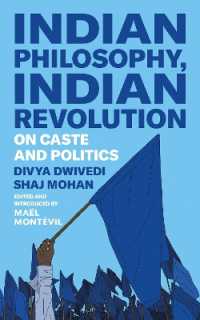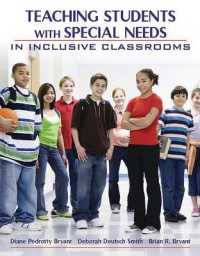- ホーム
- > 洋書
- > 英文書
- > Science / Mathematics
Full Description
Decolonizing Medical Education, Research and Practice provides comprehensive insights into the decolonization of medicine by focusing on three key aspects: curricula, research and medical practice. There is a gap of in-depth and thorough analysis of decolonization that covers these three facets. The process of decolonization is complex and multifaceted. For example, colonialism contributed to and perpetuated false beliefs about racial hierarchies and differences in physiology based on race. Such ideas historically influenced medical research efforts, education, and practice, resulting in discriminatory treatment of some research subjects and patients. Moreover, attempts to address such issues can be challenging as existing medical and biomedical sciences curricula are rooted in Eurocentric perspectives and historical traditions. The harms of colonialism and systemic racism remain as they are often structurally embedded in populations to thereby perpetuate inequity and access to healthcare. The first part of this book explores these challenges providing an in-depth and critical analysis of such issues. The second part focuses on potential solutions and includes case studies which attempt to address such challenges. With the goal of establishing a fair, inclusive, culturally sensitive and representative healthcare system to serve communities at a global level and while undoing traumatic experiences from the past. Written by global experts for academics at medical schools/colleges, under- and postgraduate students pursuing medical, allied health and biomedical sciences, postdoctoral fellows, doctors/clinicians, health care professionals, leaders at universities, leaders in research and healthcare, as well as policy makers.
Contents
Part I: Challenges
1. Intersections between colonialism, scientific racism and race-based medical practice
2. Case study: colonialism and malaria
3. Case study: black people feel less pain than whites
4. Systemic racism and healthcare
5. Case study: structural racism and myocardial infarction
6. Case study: structural racism and BiDil
7. Case study: a clinician's personal experiences and reflections on racism in medicine
8. Politics determine healthcare outcomes
9. The role of medical schools in propagating physician bias in terms of race
Part II. Solutions
10. Remedying racial inequities in medical education, research, and clinical care
11. Removing race from human genetics
12. Decolonizing medicine - the case for a Global South-centered model
13. The twin model - decolonizing research through equitable collaborations
14. How to decolonize the medical curriculum
15. Curriculum reform on race in preclinical medical education
16. Case study: decolonizing the curriculum of postgraduate biomedical students
17. Integrating indigenous knowledge into the curriculum
18. Integrating African traditional health knowledge into the health sciences curriculum








